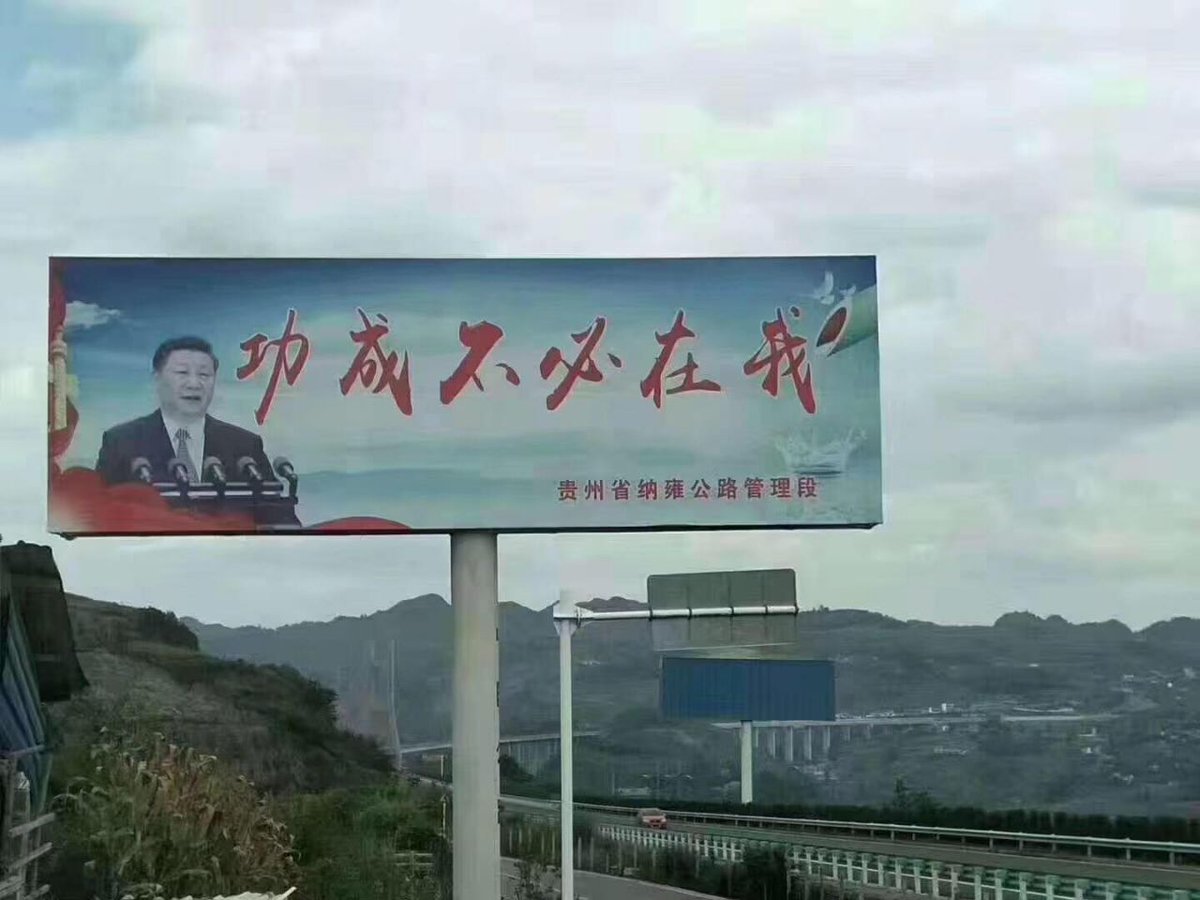At times, parsing propaganda for deeper meaning is difficult. At others, the (unintentional) message is hidden in plain sight. In October 2018, one bus passenger in Guizhou’s Nayong County realized that a roadside billboard quoting Xi Jinping said, “With me in charge, failure is guaranteed,” when the characters are read from right to left, as is common on banners.
The billboard that birthed a million memes.
The billboard was quoting a speech Xi had given to cadres in Hainan in April of that year, reminding them that “Today’s efforts will bear fruit after I’m gone,” which is how it reads from left to right. The phrase is often paired with another line to form a couplet touting the value of hard work in attaining revolutionary goals. The quote is a paraphrase of May Fourth Movement leader Hu Shih’s instruction to Peking University graduates in 1932. (Hu, an early Chinese Marxist-Leninst, was an opponent of the Chinese Communist Party and in the 1950s became the subject, in absentia, of a criticism campaign aimed at discrediting his writings.)
Today, both Xi’s quote and its misreading have become sensitive words subject to censorship. A recent test-search for “Today’s efforts will bear fruit after I’m gone” on the popular question-and-answer website Zhihu returned no results. The second line of the couplet returned dozens of results, an indication that censors are aware that the first line is ripe for misinterpretation. It has now become a standard example of “low-level red, high-level black” messaging that appears to parrot the Party line, but upon closer examination actually subverts it.
This is not the first time a quote from Xi Jinping has drawn censure on the Chinese internet. In 2021, ardent online nationalists commonly known as “little pinks” unwittingly labeled Xi Jinping a “race traitor” after a Weibo page dedicated to coverage of a Japanese boy band quoted Xi on the anniversary of the 1937 Nanjing Massacre. Many Chinese people’s real feelings towards Xi remain a mystery, due to heavy censorship and the threat of arrest. Late last year, The Wall Street Journal’s Liza Lin reported on the difficulty of finding an honest online opinion about Xi in mainland China:
On Baidu Inc.’s popular online discussion forum Tieba, there are more than 184,000 posts about Mr. Biden. Meanwhile, a search for Mr. Xi’s name returns the message, “Sorry, according to related laws and government regulations, the following results cannot be shown.”
The only content related to Mr. Xi shown on Douyin, the Chinese version of TikTok run by TikTok’s parent ByteDance Ltd., is that generated by state media or party entities. For all the app’s freewheeling videos, it is near-impossible to find ones of ordinary Chinese expressing opinions about their leader.
[…] One Zhihu post on a speech by Mr. Xi to a branch of the People’s Liberation Army in which he called for “the motherland to be unified”—a reference to taking control of Taiwan—appeared to have attracted almost 220 comments. None of them could be viewed; a message displayed said the comments section was closed.
The Twitter-like Weibo platform allows searches for Mr. Xi’s name only by users in China, who must register with a Chinese cellphone number linked to their identity card and log in to see search results. Again, results are almost all articles or videos in some way linked to state media or government agencies. [Source]








